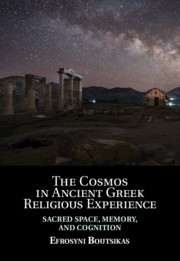Book contents
- The Cosmos in Ancient Greek Religious Experience
- The Cosmos in Ancient Greek Religious Experience
- Copyright page
- Dedication
- Contents
- Illustrations
- Graphs
- Tables
- Acknowledgements
- One Introduction
- Two Methodological Advances, Approaches, and Considerations
- Three Worship in Space and Time
- Four Astronomy and Perceptual Cognition in Apolline Cults
- Five The Cosmos in Manifestations of Identity, Memory, and Remembrance
- Six Cosmic Time in Greek Mystery Cults
- Seven Epilogue
- Appendix
- Glossary
- Notes
- References
- Index
- Plate Section (PDF Only)
Two - Methodological Advances, Approaches, and Considerations
Published online by Cambridge University Press: 04 November 2020
- The Cosmos in Ancient Greek Religious Experience
- The Cosmos in Ancient Greek Religious Experience
- Copyright page
- Dedication
- Contents
- Illustrations
- Graphs
- Tables
- Acknowledgements
- One Introduction
- Two Methodological Advances, Approaches, and Considerations
- Three Worship in Space and Time
- Four Astronomy and Perceptual Cognition in Apolline Cults
- Five The Cosmos in Manifestations of Identity, Memory, and Remembrance
- Six Cosmic Time in Greek Mystery Cults
- Seven Epilogue
- Appendix
- Glossary
- Notes
- References
- Index
- Plate Section (PDF Only)
Summary
In recent years, the study of ancient ritual experience and the role of emotions has become a subject of intense research.1 It is now somewhat a scholarly cliché that experience of a space is influenced by architecture and movement. Of equal importance to this experience, though, is time (day, night, and the seasons). The aspect of time – or, in more general terms, the inclusion of the total environment – has received, as we discussed in Chapter 1, very little attention in the study of ancient Greek ritual. The three components comprising the total physical environment (land, sky, time) are equally critical in shaping memories and experience. Previous studies have traditionally focused on a combination of these components, but hardly on all three.2 Just as the study of landscape or architecture alone cannot inform us of experience, a sole focus on the time when rituals took place, or indeed only on the orientation of the architecture in space, cannot be sufficient to enrich our narrative. It is now accepted that cognition is to be understood as ‘embedded in its surroundings’, not as a detached system.3 Thus a combined study of external elements and internal processes has the potential for a far better understanding of ancient cognition.
- Type
- Chapter
- Information
- The Cosmos in Ancient Greek Religious ExperienceSacred Space, Memory, and Cognition, pp. 13 - 30Publisher: Cambridge University PressPrint publication year: 2020



